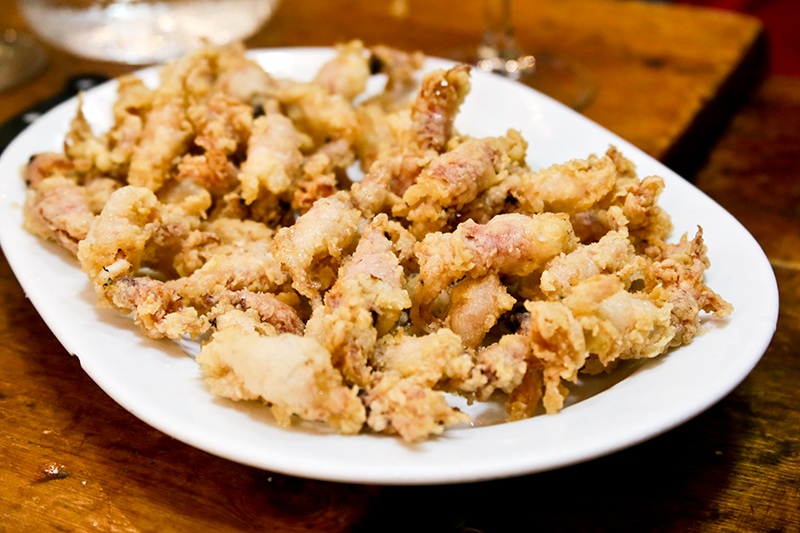“La carta” is the full list of products of the restaurant. “El menú” is a limited list of dishes for first and second course and dessert, all with a close price. This come from old, when a law was passed that all restaurants must have an affordable menú for workers.

An Introduction to la Carta
In any given restaurant in Spain, you may find yourself confronted with a dizzying array of menu items and section headings. If you are unfamiliar with the way people eat in Spain, a Spanish menu (la carta) can be pretty overwhelming. With so many misconceptions out there about Spanish cuisine, we thought we’d break things down to make a typical dining experience in Spain less confusing.
First of all, let’s talk about the way they eat in Spain. It’s perfectly acceptable to have a quick bite in a casual establishment or turn eating into a social affair across several different places, as is the case when you ir de tapas or partake in el txikiteo. While there are many ways to eat on-the-go in Spain, a formal meal has a long-standing place in the gastronomic culture. It wouldn’t be surprising for a proper comida to span the length of your entire afternoon. When the Spanish do stop for a meal, they like to take their time and enjoy it. This usually goes down in one of two ways: a group goes to a bodega, tasca or taberna for raciones or they go to a restaurante for a more traditional meal consisting of several platos.
How to Order Raciones
A common misunderstanding when it comes to Spanish cuisine is that tapas are a type of dish intended to be shared among the table. If you go by that definition, what you are describing is much more closely related to what are known across Spain as raciones. While ordering several tapas among a group wouldn’t be considered an acceptable substitute for a meal, the opposite is true when it comes to raciones.
It is not typical to order raciones by yourself; the portions are far too large to be enjoyed without company. To do so would really limit the variety of what you are trying since you are unlikely to have the appetite to eat that much. It’s advisable to have a group of 4 or more people when you go for raciones. In the case that you are only 2 or 3 people, some places offer media raciones, which are half the quantity of a normal ración. In addition to being good for small groups, medias are a nice option for a larger group that wants to sample a bit of everything or when not everyone in your group is interested in eating a particular dish.
 A ración of chipirones fritos – small fried squid
A ración of chipirones fritos – small fried squid
Another thing to consider, especially if you are ordering a lot of different raciones, is that while things like embutidos (sausages and other charcuterie) and quesos (cheeses) will be frio (served cold), other dishes like berenjena (eggplant) and albondigas (meatballs) are served hot. If you order everything at once, it’s very likely that your food will go cold before you have the chance to eat it. It’s common practice to order a couple of things to get started, and order more as you go along, thus eliminating the need to speed-eat your food at it’s intended temperature. Another advantage of ordering a bit at a time is that you can gauge how many raciones you want to eat and avoid ending up with more than you know what to do with, not to mention wasting good food and money.
 Alcachofas – fried artichokes – a serving like this would normally be considered a media ración
Alcachofas – fried artichokes – a serving like this would normally be considered a media ración
Different types of Menu: A la carte vs table d’ hôte
FAQ
Does carta mean menu in Spanish?
What does carte mean in a menu?
Do French say menu or carte?
What is the Allah carte menu?
What does Carta mean?
(Translation of carta from the GLOBAL Spanish–English Dictionary © 2021 K Dictionaries Ltd) playing card [noun] one of a pack of cards used in card games. (Translation of carta from the PASSWORD Spanish–English Dictionary © 2014 K Dictionaries Ltd) Verdaderamente no se trata de un menú a la carta. Indeed, it is not an à la carte menu.
What does a la carte menu mean?
When a restaurant offers separately priced items, you can describe its menu as a la carte. Ordering this way is also a la carte, like choosing individual pieces of sushi instead of an entire platter or meal. The literal meaning of the French phrase is “by the card,” although it’s used in both languages to mean “according to the menu.”
Do restaurants serve dishes in a Carta?
If you are in the mood for a more formal meal or you just don’t feel like sharing your food, there are plenty of restaurants that serve dishes in courses, either from la carta or in the form of a menú del día (or menú for short). On a typical carta, things will be broken down into courses or categories.
What does à la carte mean?
Related words Compare à la carte with set menu or prix fixe, which is a menu with a specific set of meals to choose from where the price charged for each meal is the same. Word origins Note that à la carte is a French phrase, meaning ‘according to the menu’. Collins COBUILD Key Words for Hospitality.
